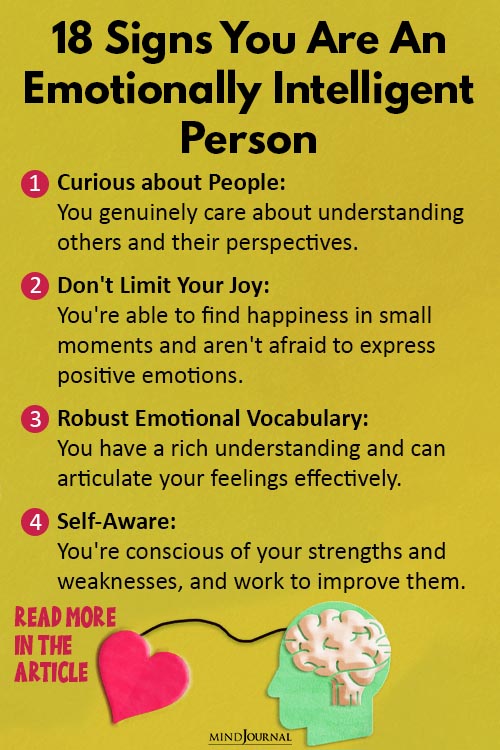Emotionally Intelligent
Do you want to outperform people with high IQ? Then you must focus on improving your emotional intelligence sometimes referred to as EQ (“emotional quotient”) because IQ is not the sole source of success.
According to Psychologists Peter Salovey and John D. Mayer, an emotionally intelligent person has the ability to perceive emotions, reason emotions, understand and manage emotions.
Emotional intelligence has become a hot topic after the release of Daniel Goleman’s book “Emotional Intelligence: Why It Can Matter More Than IQ.”This is the skill most people are trying to master to become successful in psychology, healthcare, education, business, workplace, and many other areas. A person with high EQ not only has a strong understanding of personal emotions but also understands others’ emotions like an empath, communicate with them, make decisions, and solve problems.

Here are 18 signs you are emotionally intelligent
1. You’re Curious about People
People who are curious to learn and improve their lives have success stories to tell. Emotionally intelligent people are passionately curious about everything in life. Their learning mindset helps them learn more and grow more. Such knowledge acquisition over time and intellectual investment lead to high EQ, which positively impacts every aspect of life like relationships. Hence, they don’t give up quickly, even when everyone else has given up.
Related: 12 Ways To Improve Emotional Intelligence Through Self Care
2. Don’t Limit Your Joy
Emotionally intelligent people are masters of their happiness. They know whether they are right or wrong, so they don’t seek validation from other people. Their pleasure and satisfaction don’t depend on other people’s opinions. Their self-worth comes from within!
3. You Have a Robust Emotional Vocabulary
Emotional vocabulary is the ability to say something more than just good or bad when someone asks “how are you feeling?” Emotionally intelligent people can accurately identify pleasant and unpleasant feelings and emotions and use specific words to express themselves. For instance, they may say they are feeling ‘motivated or optimistic’ instead of saying ‘I’m feeling better’. People with low EQs cannot do this and lack the extensive vocabulary to verbalize their state of mind. It is important to master your emotions because unlabeled emotions are the cause of stress and undesired actions.
4. Aware Of Strengths and Weaknesses
Emotionally intelligent people demonstrate a high level of internal and external self-awareness and are well-aware of their strengths and weaknesses. When facing stimuli, they know how to manage themselves proactively and reactively that enables them to succeed. They use their strengths to full advantage and prevent their weakness from holding them back.
Related: 15 Enlightening TED Talks on Emotional Intelligence
5. Good Judge of Character
People with high EQ are empathetic, understand emotions, and highly curious about their surroundings and people in life. They have high self and social awareness, which makes it easy for them to read human behavior and their intentions. Being an exceptional judge of character, they can unveil the hidden motives of people. Thus, emotionally intelligent people can easily get through messy situations.
6. Difficult to Offend
Having a strong sense of who they are and what they want in life, emotionally intelligent people are tough to offend. Trying to belittle them is a futile attempt because they don’t feel the need to defend or explain themselves. Being confident and open-minded, they know how to draw a line between personal and professional life. People with high EQ know how to handle constructive and destructive criticism.
Related: How to Raise Emotionally Intelligent Children: 3 Crucial Lessons To Teach
7. Let Go of Mistakes
Emotionally intelligent people accept their mistakes and move on. They don’t brood on ‘what if I did that’ sort of thinking. They learn from their mistakes and prepare better plans for better outcomes in the future. Not repeating the same mistake twice is what pushes them towards success. Dwelling on past mistakes only adds to stress and clog your mind with negativity so much that you fail to focus on new ideas and improvements.
Related: 4 Easy Ways To Let Go Of Negativity From Your Life And Find Happiness
8. Hate Negative Self-Talk
Negative self-talk gives rise to limited thinking, perfectionism, feeling of depression, and relationship challenges. Emotionally intelligent people have a strong understanding of their internal and external emotions and hold high self-control. So they don’t lose power by ruminating on negative thoughts. They know how to separate their thoughts from the facts and stay positive.
Read on to know….The Power Of Self-Talk
9. Give and Expect Nothing
By giving without expecting anything in return you can leave a powerful impression on people. Emotionally intelligent people are good at this skill and they do so very spontaneously. Their motto is to build a strong and lasting relationship so they genuinely think about others’ well being. They not only have a strong desire to succeed but also help others become successful.
10. Limit Your Caffeine Intake
Consuming excessive amounts of caffeine triggers insomnia, digestive issues, high blood pressure, muscle breakdown, fatigue, and many other side effects. High EQ individuals are aware of dangers associated with excess caffeine intake so they don’t let it get better of them. 400 milligrams of caffeine a day ( about four or five cups of coffee) is an amount not associated with negative effects as per the FDA. Limit your caffeine intake so that it doesn’t put your brain and body into a hyper-aroused state.
11. Disconnect
Sheryl Sandberg, Facebook’s Cheif Operating Officer,never forgets to turn off her phone before bed. So that she is not woken up or disturbed. Doing what gives your mind a break is the sign of a high EQ. It helps you unwind yourself but also lowers stress. Even when technology demands you to be online 24/7, you must force yourself offline. Breaking the pattern is good to change the train of thought and think out of the box. Disconnecting from technology helps you better focus on other things in your life, stay focused, and sleep better.
12. Avoid Grudges

Emotionally intelligent people don’t hold grudges. Holding a grudge is like drinking rat poison and expecting the rat to die. Piling up negative emotions leads to stress, anxiety, and depression. Letting go of grudges improves mental and physical health. Forgiving people also strengthens your social bonds thereby you can better focus on your goals and dreams.
13. Perfection is not the target
Emotionally intelligent people don’t prioritize perfection. The world is not perfect and no human being on Earth is perfect. So, trying to be 100% perfect only leads to procrastination and false perceptions. So, those who chase perfection are always left with a sense of failure and unhappiness. High EQ people focus more on goals than perfection, which boosts their personal growth. They keep moving forward-thinking about what they have achieved and what are things yet to be accomplished in the future.
14. Stay Away From Toxic People
Toxic people can drain your energy so high EQ individuals limit their interactions with such people. They mostly surround themselves with positive, successful, and motivating people. Emotionally intelligent people have high self-awareness so they can keep their feelings in check and prevent unnecessary frustrations. They try hard to find solutions even in chaotic circumstances by considering the toxic person’s standpoint. By rationalizing thoughts and actions they can prevent toxic people from bringing them down.
15. Appreciate What You Have
Seeking the glass half full is the mantra of emotionally intelligent people. They accept and express gratitude for what they have in life and strive harder for what they want. Being grateful makes a person optimistic and helps you turn even a routine job into joy and ordinary opportunities into blessings. According to UCLA’s Mindfulness Awareness Research Center, the attitude of gratitude improves the grey matter functioning and slows the aging of the brain. Low EQ people lament over losses and fail to appreciate good things in life that add to stress and blocks a positive outlook towards life.
Related: 30 Epic Quotes That Will Inspire Gratitude
16. Get Enough Sleep
7 to 9 hours of sleep is a must to avoid chronic sleep deficits that are common among people with hectic work life. Adequate sleep (and on time) not only manages your stress levels but increases emotional intelligence. High-EQ individuals are aware that not sleeping enough will reduce their attention and memory and cause unnecessary psychological and emotional changes. So, they always prioritize sleep.
17. Say No

Emotionally intelligent people never have a hard time saying no. They do so because they can’t let other people’s priorities take precedence over theirs. They say no so that they can say yes to really important things in life. On the other hand, people with low EQ fear that saying no may hurt their relationships. As a result, they fail to exert self-control and avoid impulsive action, which gives rise to stress and depression. Saying no gives you the strength to prioritize your work, relationships, and your margin.
Related: What You See First In This Image Reveals How Emotionally Intelligent You Are
18. Embrace Change
Emotionally intelligent people don’t resist change because they are flexible and adaptable. They don’t look at change as a threat but consider it as an opportunity for better outcomes. So they are ready with a plan of action to make most of the change and gain success and happiness. Such quality helps them to stay ahead of the game and prevent major losses in personal and professional life.
So, are you emotionally intelligent? Leave a comment below.












Leave a Reply